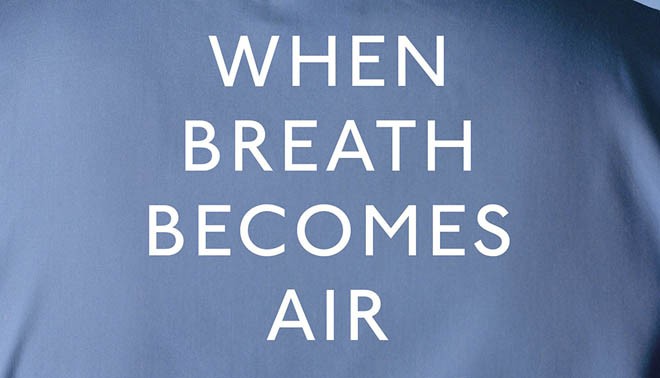
In his mid-30s, when a neurosurgeon receives the grim diagnosis of terminal lung cancer he decides to write a memoir

Dr Paul Kalanithi’s memoir begins not from the beginning, but from the end -- long after the writer, doctor and philosopher had succumbed to his fate. A snippet from T.S. Eliot’s Whispers of Immortality serves as a grim image prefacing the book’s prologue, of skeletons grinning from under the ground and as a warning for what is to come in this tragic yet inspiring tale. The foreword functions almost as an afterword, as a brief external perspective into the personality that we, as readers, are endlessly intrigued by through the course of the book. While writing or reading about When Breath Becomes Air, the narrator of our story must be referred to as Paul, since an intimate relationship has been forged between the writer and reader.
We see Paul in his most vulnerable moments. First, as a child laying in the desert plateau of a small town in Arizona, promising himself he would never become a doctor like most men in his Indian immigrant family. Then, through his undergraduate years at Stanford University studying Human Biology and English Literature in his quest to find meaning in the world. Moving on to his Masters degree analysing Walt Whitman’s poetry and the realisation that literature as a discipline was limited in its scope. The discipline was insufficient to answer the question he pursued: "Where did biology, morality, literature, and philosophy intersect?" And towards the end we see him lying in a hospital room in a patient’s gown, squinting at x-rays of his own lungs, matted with tumors and facing the prospect of his own mortality.
Paul’s story is most fascinating, perhaps, because of the meandering yet paradoxically single-focus trajectory of his life: his obsession with the meaning behind life and the way to divine it became a self-fulfilling prophecy of sorts. Upon completion of his time at Stanford, he realised studying and practicing medicine was in fact the most effective means of arriving at his desired conclusion, "Direct experience of life and death questions was essential to generating substantial moral opinions about them."
Little did he know, the ‘direct experience’ he spoke of would manifest in a far more sinister way than he could imagine -- in his mid-30s he received the grim diagnosis of terminal lung cancer, which ultimately proved the impetus for him to pen this memoir.
"Medical school sharpened my understanding of the relationship between meaning, life and death," Paul wrote of his time in Yale Medical School. It was there that he met Lucy, a fellow doctor in training and the woman he would marry. Paul’s time as a doctor in training is as amusing as it is insightful: he describes the awkwardness of encountering a cadaver for the first time, the scalpel gliding through its skin as easily as a zipper being undone, of his first experience of delivering babies via an emergency C-section, which doubled as his first experience of death when they died the same day, to his time specialising as a neurosurgeon when he tucked his ice cream sandwich behind a computer as a road accident victim with his brain leaking out of his nose was brought into the ER (emergency room), only to remember the ice cream hours later.
The stresses of life as a doctor are poignantly illustrated by Paul when he learns of his med-school buddy’s suicide after a particularly complicated case and death of a patient. He writes, "Our patients’ lives and identities may be in our hands, yet death always wins. Even if you are perfect, the world isn’t."
In the book, we see distinct facets of Paul’s personhood: as a child lost in a vast desert, as a young man figuring out his path in life, as a doctor determined to find the crucible between life and death, and finally as a patient suffering from a terminal illness. We see Paul and his wife Lucy trying to cope with the life altering news that most of his organs had been ravaged by lung cancer and tumours, and ultimately decide that they should have a child together.
It is at this juncture that Paul returns to his literary roots, as he recalls Beckett’s famous words, "I can’t go on. I’ll go on." Watching Paul navigate the uncertain waters of illness and impending death while still trying to maintain some semblance of a doctor’s life tugs at the reader’s heart strings, for we realise that no matter how much training a professional receives on confronting death, one is never really ready to accept their own. We see Paul, ailing and infirm but present for the birth of his baby girl, almost too frail to hold her against his chilled skin.
Too soon, Paul slips away from the world with his loving family and gurgling new-born baby by his side, as told in the book’s epilogue penned by Lucy. It is almost unbearable to read the end of When Breath Becomes Air, attested by the fact that each subsequent reading of the book summons a flood of tears despite knowing how the tale will end. It is a loss of a wise friend, one who lived with such dignity and grace, and bravely confronted death in his life’s work as a doctor and neurosurgeon, in his illness, and in the words he wrote in this book. It serves as a testament to his daughter, Cady, whom he hopes will remember some slivers of her departed father, but also speaks as an inspiration to the readers, for we are reminded that even in the face of tragedy and hopelessness, someone can hold their head high and fight to answer the questions he has always dreamed of answering.